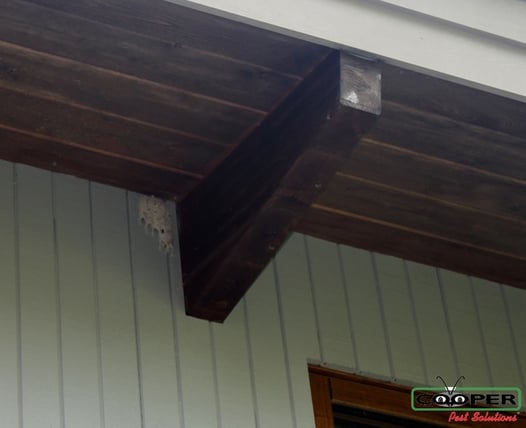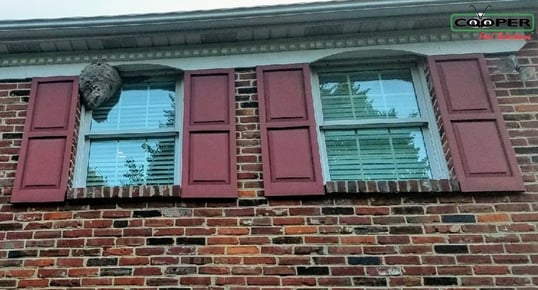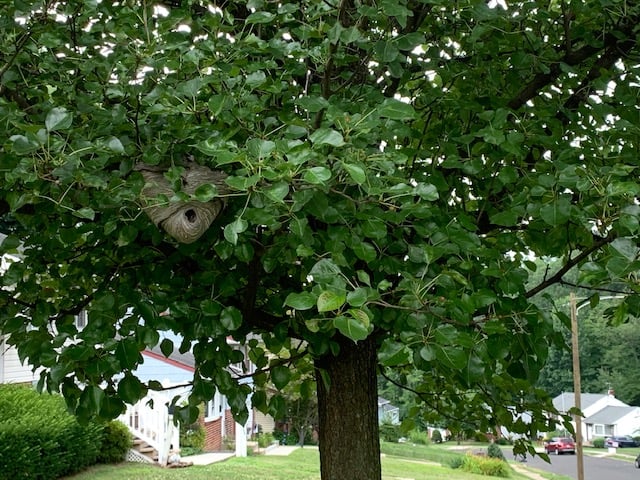How to Get Rid of Stinging Insects
Mud wasps, paper wasps, yellow jackets, and hornets begin flying around in Spring and Summer. If you have encountered any stinging insect, you know how stressful it can be. Have you seen stinging insects around your home? Or maybe you want to learn more about how wasp and hornet nest removal works. Our library of stinging insect information will answer your questions.
Stinging Insect Library Shortcuts
How can I find the best wasp service near me?
How to Buy a Stinging Insect Service Online
Can wasps be prevented from nesting on my home?
Why should yellow jacket nests be removed in the fall?
Why You Shouldn't Self Treat for Yellow Jackets
How can I find the best wasp service
near me?
When it comes to wasp nest removal, please ensure that the pest control company you choose has the necessary experience, knowledge, and tactics. Any reputable pest control company should be able to answer the following questions and provide comprehensive responses.
Questions to ask a pest control company
- How long have you been performing pest control?
- What training do your technicians receive? Are they DEP and state certified?
- What pesticides and materials are used to perform the service?
- How are you going to perform the service? Why do you believe this is the best option?
- What type of wasp do I have? How did you come to this conclusion?
- How quickly can I expect them to be gone? What happens if they come back?

Some companies may present themselves as “experts,” and that they have “the best wasp service,” but cannot honestly answer these questions. Any reputable company will have an expansive knowledge of pest biology and behavior as well as new industry developments and skills. Without the proper training, a technician will likely respond to your unique issue in a cookie-cutter way and perform services with a “one size fits all” approach.
How to Buy a Stinging Insect Service Online
You may be seeing stinging insects such as wasps, hornets, and yellow jackets flying around and nesting at your home this summer. Although they are not likely to sting unless provoked, it’s still advised that you get the quickest, highest quality nest removal to ensure the safety of your family and pets. Why take chances when you don’t have to?
Identifying the nest that the stinging insect created is the first step in identifying the pest you are dealing with. Once you identify the nest, all you need to do is order our One Time Stinging Insect Service and the nest will be removed with our same day or next day service.
Can wasps be prevented from nesting on my home?
Paper wasps are one of the first insects to become active in the early spring months (April/May) and will continue to be active throughout the entire summer. As they emerge, they will begin to build their nests on various structures, including homes, decks, swing sets, storage sheds and much more. They will collect wood from wooden playsets, deck railings, fences or barks of trees to help construct their nests.
Since many people are afraid of wasps, seeing a nest could cause alarm. Although wasps are only moderately aggressive, they will readily sting if they feel their nest is being threatened. Their sting can be painful and can cause an anaphylactic reaction in those who are allergic.
“Some people are adverse to stinging insects,” said Dr. Richard Cooper, staff entomologist at Cooper Pest Solutions. “They don’t want to treat a nest after it has been built, they want a preventive approach, and that’s why many of our homeowners add a wasp prevention service to their home services.”
Why should yellow jacket nests be removed in the fall?
“Nests are at their largest at the end of the summer and generally the yellow jackets can be more aggressive,” said Dave Burgess, Vice President of Operations at Cooper Pest Solutions. “Also as it gets cooler the workers all die off, so if during this time the nest is in the home, the yellow jackets may find their way inside the house.”
During the early fall, yellow jackets tend to become more aggressive as their natural food source declines. Since they are attracted to sweets and proteins, you may happen to notice them more around trash receptacles, barbecues and at tailgating events near the beer or sugary drinks.
The combination of yellow jacket numbers being at their peak coupled with an increased level of aggression, the fall months are the most dangerous time for being stung without provocation. Those who are allergic to bee stings should exercise caution around the wasps because they are capable of stinging multiple times. DO NOT taunt or provoke the yellow jackets otherwise; they will easily sting you, especially in the fall.
Why You Shouldn't Self Treat for Yellow Jackets
Most of the DIY remedies suggest that homeowners get in close contact with the yellow jacket nests to spray or dump the solution into the nest, however, this can be extremely dangerous. You should never get near a yellow jacket nest without the proper safety gear on otherwise you’re subjecting yourself to the possibility of getting stung multiple times.
“Most pesticides available to the public are repellents,” said Dave Burgess, Branch Manager. “The aerosols that spray from afar are often the most repellent and the ones most likely pushed for stinging insects, that way the homeowner avoids the stings. The side effect of that is when you treat an entrance hole, the bees may try to find another way out. If they are nesting in a wall void or soffit area, the other way is often inside the house!”
“Once the yellow jackets start moving through the walls it is near impossible to eradicate the yellow jackets,” Burgess said.
Dr. Richard Cooper, Technical Director at Cooper Pest Solutions, added “The nest will be destroyed but the dispersing yellow jackets spread throughout the home, travelling through the walls and finding their way out into the living areas of your home. It’s a real disaster, the yellow jackets can continue popping out in different rooms for weeks when a nest is improperly treated.”
Allergists-immunologists recommend the following additional precautions to avoid insect stings:
- Avoid wearing sandals or walking barefoot in the grass. Honeybees and bumblebees forage on white clover, a weed that grows in lawns throughout the country.
- Never swat at a flying insect. If need be, gently brush it aside or patiently wait for it to leave.
- Do not drink from open beverage cans. Stinging insects will crawl inside a can attracted by the sweet beverage.
- When eating outdoors, try to keep food covered at all times.
- Garbage cans stored outside should be covered with tight-fitting lids.
- Avoid sweet-smelling perfumes, hair sprays, colognes and deodorants.
- Avoid wearing bright-colored clothing.
- Yard work and gardening should be done with caution. Wearing shoes and socks and using work gloves will prevent stings on hands and feet and provide time to get away from an unexpected mound.
- Keep window and door screens in good repair. Drive with car windows closed.
- Keep prescribed medications handy at all times and follow the attached instructions if you are stung. These medications are for immediate emergency use while en route to a hospital emergency room for observation and further treatment.
- If you have had an allergic reaction to an insect sting, it's important that you see an allergist-immunologist.

If you are tempted to take down a wasp nest on your own, you’ve probably heard of the following strategies:
- Fire/Burning- Some people say that using fire will eliminate stinging insects and get rid of their nest. The problem with using flames is that nests are usually built in trees and bushes, or on your home. Trying to destroy a nest with heat will greatly damage your home or light vegetation on fire. Not the safest option.
- Dish Soap- A lot of bloggers and YouTubers suggest using a mixture of dish soap and water in a spray bottle to physically soak the active nest and eliminate the colony. This can be effective in certain scenarios. If you are brave enough to rely on soap and are willing to get within a few feet of defensive stinging insects, then it might be worth a shot. However, even if you complete this dangerous feat, soap won’t stop the pests from returning.
- Using a Bat- Even at night time, this is just not safe. Defensive wasps and hornets are willing to die for the colony and will sting when provoked. If someone treated your home like a piñata, you’d be angry too.
Professional pest control services differ from any DIY treatments because they have access to different tools. For example, wearing bee gear allows technicians to get very close to the nest without the risk of getting stung.
Professionals also have access to industry-grade pesticides that will not only kill wasps and hornets but also prevent them from coming back. Knowing the biology and behavior of stinging insects is a big benefit that professionals have over DIYers. By understanding how they behave and why it’s more than just physically taking down the nest. Each case is different, and nests are treated differently by pest, level of infestation, and location.


